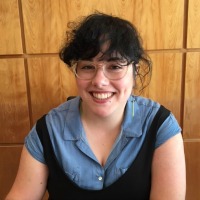
This post was written by Rachael Winter Durant, who received a GLAM Cross-Pollinator Registration Award to attend the DLF Forum.
MCN affiliate Rachael Winter Durant is the Digital Assets Manager at the Portland Art Museum, where she implements the workflows and determines the long-term strategies for digital delivery and preservation of cultural heritage information.
She places deep value in utilizing standards and procedures that allow people and institutions to engage digitally with cultural objects and preserve these assets for the future. To promote this engagement, she has chosen three primary areas to focus her early career professional development: digital accessibility, the description of visual resources, and digital preservation.
As a member of the Museum Computer Network (MCN), she’s excited about the opportunity to attend DLF Forum 2018 and NDSA Digital Preservation 2018 and to engage with colleagues outside of the museum field who are also active practitioners working and innovating around these issues, specifically through the lens of librarianship.
As I prepared to attend DLF Forum 2018 — my first DLF Forum, which I would be attending as the Museum Computer Network (MCN) affiliate through a GLAM Cross-Pollinator Fellowship — I read the code of conduct, combed through the schedule, and attended museum cohort visioning sessions. I felt energized by the focus on social justice and ethics in our profession, but in many ways preparing for the Forum did not feel dissimilar from a courting ritual between two organizations. I found myself a little anxious, gauging what my institution and DLF could offer each other and how we could help each other grow and be supported. Coming from a mid-size art museum that functions as 501c3 nonprofit, I was determined to bring knowledge and ideas back to my institution that I could put into action, even though my department doesn’t have the team of open-source software developers that many of the DLF member institutions appear to have in their libraries.
When I arrived at the Forum, what I found was a community of deeply thoughtful librarian technologists examining the very core of digital librarianship; the power structures, cultural contexts, and unacknowledged invisible labor in our profession — and their unique repercussions in the digital sphere. These foundational contexts to how knowledge repositories have developed and been sustained throughout history are as critical at the smallest institutions as they are at the largest. In a recent New York Times article titled “The Newest Jim Crow” by Michelle Alexander, the author quotes data scientist Cathy O’Neil saying, “It’s tempting to believe that computers will be neutral and objective, but algorithms are nothing more than opinions embedded in mathematics.” This dangerous assumption of fairness and neutrality was one of the critical issues that DLF Forum 2018 tackled, and my biggest takeaways from the week centered around strategies to combat it.
This dangerous assumption of fairness and neutrality was one of the critical issues that DLF Forum 2018 tackled, and my biggest takeaways from the week centered around strategies to combat it.
Discussions about colonialism, ethics, and power in digital libraries happened in both explicit and implicit ways throughout the Forum. But the presentation I have revisited again and again since the Forum is Rafia Mirza’s and Brett D. Currier’s “Towards a Praxis of Library Documentation.” Admittedly, having taken an early career detour as a technical writer, I am predisposed towards calls for good documentation. Yet, I had not considered the deep-seated ethical implications and power dynamics of thoughtful documentation, or a lack thereof. As Mirza and Currier explain, “Documentation is a fixation of everyone’s common understanding upon a decision in written form.” And the implications of ethical documentation are much deeper than just increased productivity. When we take the time to examine the power dynamics of how documentation is created (if it is created), who has access to it, and who uses it, it has the ability to build trust and even support ethical labor practices. A praxis of documentation should push us to examine where unethical practices are introduced into our processes. By making expectations explicit, labor becomes more visible, laborers feel empowered and even respected.
When we take the time to examine the power dynamics of how documentation is created (if it is created), who has access to it, and who uses it, it has the ability to build trust and even support ethical labor practices.
In the weeks since the Forum, I have returned to the Museum and reflected on my notes from the sessions. How am I showing up in my work for my colleagues? Student workers? Under-represented communities? Where do gaps in documentation exist for my projects, and what problems could be solved if good documentation existed? Mirza and Currier point out that “along a long enough timeline, everything becomes collaborative.” With this in mind, I pull up my wiki and begin writing.
Want to know more about the DLF Forum Fellowship Program? Check out last year’s call for applications.
If you’d like to get involved with the scholarship committee for the 2019 Forum (October 13-16, 2019 in Tampa, FL), sign up to join the Planning Committee now! More information about 2019 fellowships will be posted in late spring.
